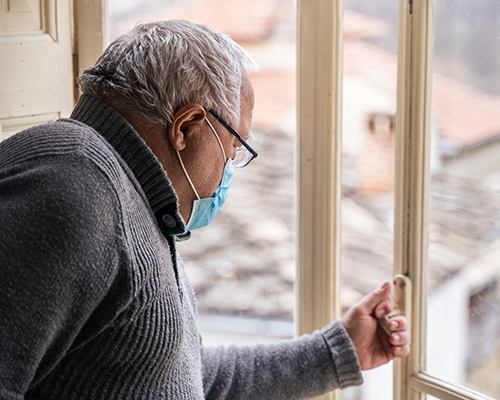
For many people, the outbreak of coronavirus (COVID-19) is a major source of fear and anxiety.1 If you have gout, the extra stress you may be feeling could affect you in ways you might not expect.2,3 Some folks with the disease are wondering: How might the stress of COVID-19 affect people with gout?
Recognizing stress
Unless you were already living in isolation, you have probably heard of the pandemic known as COVID-19. For many, the situation is stressful for a number of reasons, and this stress can manifest itself in a variety of unexpected ways1:
- Changes in eating habits and/or sleep patterns
- Difficulty concentrating and/or sleeping
- Worsening chronic health problems
- Worsening mental health conditions
- Increased alcohol, tobacco and/or drug use
Understanding the effect of stress on gout
Gout is a common form of arthritis that is caused by high levels of uric acid in the bloodstream.2 People can develop gout when their bodies do not break down and/or remove excess uric acid as effectively as they should.2 When there is too much uric acid in the bloodstream, urate crystals can form in one or more joints.2 These urate crystals can trigger episodes of swelling, redness and excruciating pain called an “attack” or “flare.”2 Emotional stress is one of the risk factors that can set off a gout attack.2,3
Reacting to the pandemic
Your feelings about COVID-19 may cause you to experience all kinds of emotions.1 You might find yourself constantly thinking about how to protect yourself and your loved ones from the virus.1 Maybe you are feeling isolated and lonely.1 Perhaps you are worrying about finances because you have lost income. Or maybe you are concerned that your regular medical care (eg, planned doctor visits and tests) will be interrupted.1 All of these reactions are normal (not to mention completely understandable), and it is important to cope with them in a productive way.1
Taking care of your mental health
To help offset the negative emotions you may be feeling as a result of COVID-19, focus on caring for your mental health.1 Some ways you can do this are to1,4:
- Maintain your regular routine—predictability may help you to feel more in control
- Do your best to connect with loved ones by phone, email, text, video chat or even snail mail
- Take breaks from watching, reading about or listening to news about the pandemic (including social media platforms)
- Look after yourself:
- Eat healthfully
- Continue taking your medications and, if you have a chronic condition, be aware of changing or worsening symptoms
- Participate in regular physical activity
- Get enough sleep
- Meditate, stretch and take deep breaths throughout the day
- Avoid drugs and alcohol
- Stay busy by picking up a new hobby that you can do at home or tackling a project you’ve been meaning to start
- Choose to focus on the positive—for example, consider starting each day by making a mental (or paper-and-pencil) list of everything in your life you are grateful for
- Maintain a sense of hope and do your best to accept that some days will be better than others
Getting help if you need it
Many unknowns lie ahead, but one thing is for sure—no one is in this alone. If the stress you feel as a result of the coronavirus pandemic is affecting your health or disrupting your day-to-day life, be sure to contact your doctor or another healthcare professional. He or she can help you get the care you need to stay well and the support you need to cope.
Test Your Gout Knowledge
How much do you know about gout? Take this interesting and informative gout quiz to find out.
TAKE QUIZ
NOTE: This article was not written by a medical professional and is not intended to substitute for the guidance of a physician. These are not Hikma’s recommendations for gout flare prevention, but rather facts and data collected from various reliable medical sources. For a full list of resources and their attributing links, see below.

